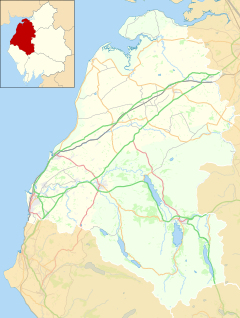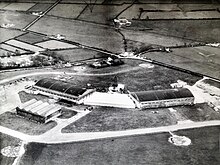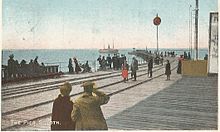This is an old revision of this page, as edited by Devokewater (talk | contribs) at 19:11, 1 July 2023 (Fixing style/layout errors). The present address (URL) is a permanent link to this revision, which may differ significantly from the current revision.
Revision as of 19:11, 1 July 2023 by Devokewater (talk | contribs) (Fixing style/layout errors)(diff) ← Previous revision | Latest revision (diff) | Newer revision → (diff) Port town in Cumbria, EnglandTown and parish in England
Silloth
| |
|---|---|
| Town and parish | |
 Criffel Street, Silloth Criffel Street, Silloth | |
  | |
| Population | 2,906 (2011) |
| OS grid reference | NY113536 |
| Civil parish |
|
| Unitary authority | |
| Ceremonial county | |
| Region | |
| Country | England |
| Sovereign state | United Kingdom |
| Post town | WIGTON |
| Postcode district | CA7 |
| Dialling code | 016973 |
| Police | Cumbria |
| Fire | Cumbria |
| Ambulance | North West |
| UK Parliament | |
| 54°52′08″N 3°22′52″W / 54.869°N 3.381°W / 54.869; -3.381 | |
Silloth (sometimes known as Silloth-on-Solway) is a port town and civil parish in Cumberland, Cumbria, England. Historically in the county of Cumberland, the town is an example of a Victorian seaside resort in the North of England.
Silloth had a population of 2,932 at the 2001 Census, falling slightly to 2,906 at the 2011 Census.
Location
It sits on the shoreline of the Solway Firth, 18+3⁄4 miles (30 kilometres) north of Workington and 22 miles (35 kilometres) west of Carlisle. The town of Maryport lies 12 miles (19 kilometres) south, down the B5300 coast road which also passes through the villages of Blitterlees, Beckfoot, Mawbray, and Allonby. Wigton is 12 miles (19 kilometres) east, along the B5302 road, which also passes through the village of Abbeytown, 5+1⁄2 miles (9 kilometres) southeast.
History
Silloth developed in the 1860's onwards around the terminus of the railway from Carlisle and associated docks which had begun construction in 1855 to replace Port Carlisle as the deep-water port for Carlisle.
Workers from the factories of Carlisle were presented with access to the seaside, and the town flourished as a destination for day trippers. The town reached the peak of its popularity in the late 19th and early 20th centuries.
Etymology
'Silloth' means "'sea barn(s)', v. 'sǣ hlaða'." (The first word is Old English, the second is Old Norse).
Governance
Silloth is part of the Workington constituency of the UK parliament. The current Member of Parliament as of 2019 is Mark Jenkinson, a Conservative, who unseated former MP Sue Hayman at the 2019 General Election.
For local government purposes, it is in the Cumberland unitary authority.
Silloth has its own Parish Council; Silloth-on-Solway Town Council.
Churches

Silloth's largest church is Christ Church, situated in a complete rectangular plot which was planned into the original town design. It is on a commanding site at Criffel Street and the body of the church was completed in 1870. The porch tower and large broach spire were completed later in 1878, and house a ring of 8 bells which are chimed. It was designed by Carlisle architect Charles John Ferguson in the Gothic style, and is built with an interesting mix of local sandstone, and granite which was brought by the North British Railway from Newry in Northern Ireland. Much of the interior is faced with yellow brick trimmed with red.
There are several churches and chapels of other denominations in the town.
Industry

Port of Silloth
The Port of Sillothh is owned and operated by Associated British Ports. The main cargoes are wheat, fertiliser, molasses, forest products and general cargo.
Carr's Flour Mill
An example of a Victorian flour mill, the building was constructed adjacent to the New Dock in 1887. Carr's flour mill is an operating mill which supplies flour to a number of food manufacturers such as United Biscuits, Warburtons and several other leading bakeries and confectioners. Carr's Flour Mill is now owned by Whitworths.
Cheri Foam
In the 1960s two businesses that had outgrown their factory in Whitehaven re-located to Silloth airfield. They were Cumberland Curled hair and Cheri Foam. They were the largest employers in the area until the late 1970s. Cheri Foam, the larger of the two enterprises, was owned by Mr Kurt Oppenheim, who had established his business originally in Whitehaven in 1946. He bought two of the hangars on the airfield and later joined them together to create large factory space and storage units for the manufacture of polyurethane foam blocks. This was an industrial chemical process and a foam block conversion unit ('Conversion' means that the blocks were cut up into shapes like cushions and sheets to be supplied to the furniture, bedding and motor industries). In 1973 an additional factory unit was added to house the production of foam moulded car parts by high pressure injection foam machines. Machinery equipment in the factory was largely manufactured by a team of Silloth metal fitters and local electricians employed full time by the factory. There was a laboratory and a fibreglass mould making unit on site as well as a garaging unit to service the fourteen container vans that the company used to ship its production all over the UK. It was a twenty four hours a day operation with production leaving the works at all hours. The logo Cheri Foam on the sides of vans was very familiar in the area. About a hundred and fifty people worked in this factory, some from Silloth and many bussed in from Maryport and surrounds each day. The business was acquired by the Beaver Group in 1976 and Mr Oppenheim retired to join his family in London. Its main customer Times Furnishing eventually closed and after this the business ran down and eventually closed. Mr. Oppenheim established a group called 'West Cumberland Industrialists' to encourage interchange of experience and friendship between the executives of West Cumbrian businesses.

Other
Local contractor D.A. Harrison are based in Silloth, employing 200 people.
Notable people
- Jim Brough, a dual-code international rugby player, was born in Silloth in 1903.
- Cecil Leitch, golfer, was born in Silloth in 1891.
- Kathleen Ferrier, a contralto singer.
Tourism

Tourism is a major contributor to the economy in Silloth, with dozens of large and small static and touring caravan parks located within a 10 miles (15 kilometres) radius of the town centre, resulting in a large increase in the population during the summer months.
Silloth hosts several small annual events held on the town green. These include a beer festival held in September, plus a steam rally, kite and food festivals.
Amenities include a golf course.
Media
A local 'free' newspaper published monthly entitled 'The Solway Buzz', distributed to households in the area by a team of volunteers , covers news and events in Silloth and the surrounding area.
Airfield
Main article: RAF SillothThe airfield opened in June 1939, just before the start of the Second World War, and closed on 31 December 1960. Originally designed to be used by RAF Maintenance Command, 22MU, the airfield was handed over to Coastal Command during November 1939. No 1 Operational Training Unit (OTU) was then responsible for training pilots and crews from the UK and Allied Countries. Therefore, the aerodrome had twin responsibilities, the maintenance and repair of planes for use in the war effort and the training of crews from allied countries to fly planes.
Transport
Railway
Main article: Silloth railway stationThe railway to Silloth opened in 1856. The line passed through the villages of Kirkbride and Abbeytown to Carlisle. The railway carried both passengers and freight from the port. and tourists visiting the town. It was closed as part of the Beeching cuts in 1964.
Road
Silloth is on the B5302 road, which leads to the A596 and the town of Wigton, and the B5300 which connects the town to Maryport.
See also
References
- Office for National Statistics : Census 2001 : Parish Headcounts : Allerdale Archived 13 June 2011 at the Wayback Machine Retrieved 30 October 2010
- "Parish population 2011". Archived from the original on 18 June 2015. Retrieved 18 June 2015.
- Armstrong, A. M.; Mawer, A.; Stenton, F. M.; Dickens, B. (1950). The place-names of Cumberland. English Place-Name Society, vol.xx. Vol. Part 2. Cambridge: Cambridge University Press. pp. 293–4.
- "Tories win Workington from Labour". BBC News. 13 December 2019. Retrieved 13 December 2019.
- "Silloth-on-Solway Town Council".
- Silloth – Christ Church Archived 6 August 2007 at the Wayback Machine
- Hyde, Matthew; Pevsner, Nikolaus (2010) , Cumbria, The Buildings of England, New Haven and London: Yale University Press, ISBN 978-0-300-12663-1
- "Associated British Ports". Archived from the original on 22 September 2007. Retrieved 24 August 2007.
- The Cumberland News Archived 28 September 2007 at the Wayback Machine
- "Plans for new quarry in north Cumbria".
- "Plans to demolish eight buildings at Silloth Industrial Estate".
- "Silloth Green".
- "Silloth Golf Club". Silloth Golf Club. 9 November 2012. Retrieved 31 May 2013.
- "Silloth Airfield' Project".
- Barker 2010, p. 426.
Sources
- Barker, Oswald J. (August 2010). Smith, Martin (ed.). "Branch line to Silloth". Railway Bylines. 15 (9). Radstock: Irwell Press Limited. ISSN 1360-2098.
- Alan Taylor. Cheri Foam factory story.
External links
![]() Media related to Silloth at Wikimedia Commons
Media related to Silloth at Wikimedia Commons
- Cumbria County History Trust: Silloth (nb: provisional research only - see Talk page)
- Official page
- Silloth at Visitcumbria
- History of Silloth
| Associated British Ports | |
|---|---|
| Ceremonial county of Cumbria | |
|---|---|
| Cumbria Portal | |
| Unitary authorities | |
| Major settlements (cities in italics) |
|
| Topics | |